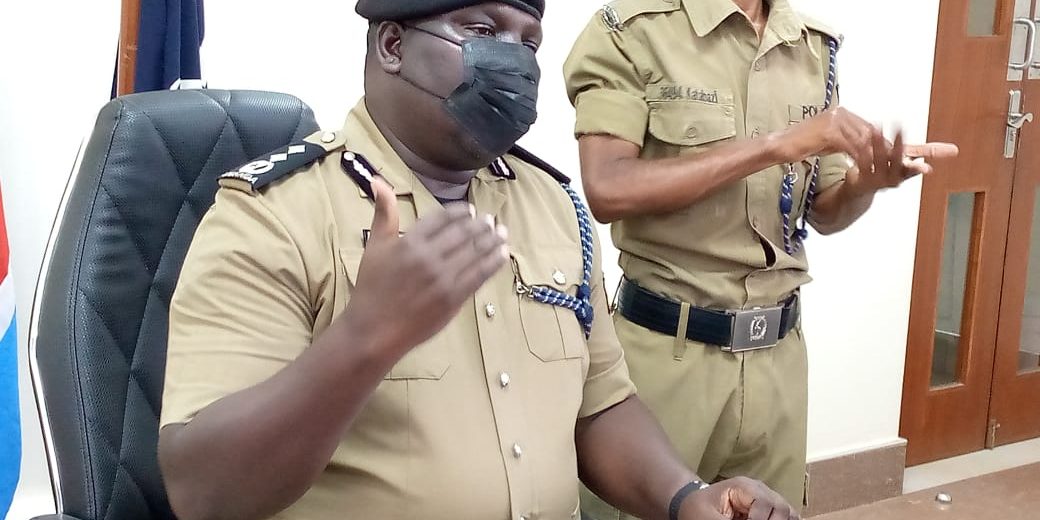Bosco Mbabazi will perhaps live to remember Uganda’s Covid19 second lockdown. Five days after president Yoweri Museveni’s address of June 18 th sending Ugandans into a second total lockdown, Mbabazi tasted the wrath of security men.
Mbabazi, a resident of Makindye West III zone recounts events that show three of his teeth allegedly removed by a punch from a security officer that landed direct to his mouth.
Mbabazi explains that it was around a quarter to 8pm when police and Local Defence Units –LDUs under the command of Katwe police operations officer run after people who were allegedly defying the 7 pm curfew.
Just like first lockdown imposed in March 2020, Museveni in June this reinstated a 7m curfew purposely to prevent people from gathering to places of leisure such bars, clubs, discos, sauna and gyms.
But security agencies comprised of Uganda People’s Defence Forces- UPDF, Uganda Police Force and LDUs probably used excessive force to enforce the curfew time and other guidelines intended to control the spread of the pandemic. LDUs are a village based defense unit UPDF directly supervised by First Division.
The LDU were recruited and trained by army to deal with violent crimes such as kidnaps, shootings and armed robberies. Very many people were beaten for living their homes during day time and security could double their punishment during evening hours.
Mbabazi says he was standing a few metres from his home when he saw people running and women screaming for help.
“I became curious when I heard when screaming for help just outside their houses. I rushed to see what was happening. A policeman came from nowhere and punched me on the mouth. Some of my teeth dropped on the ground. I started bleeding profusely from
the mouth,” Mbabazi shares.
The policemen and LDUs left after seeing Mbabazi unconscious on the ground. He was rushed o Alpha Medical Clinic by neighbours. Lilian Nassozi, a nurse who attended to Mbabazi says he was in a critical condition.
“He was brought here bleeding from the mouth and he was in severe pain. It was around 8:30pm. On that night, I received two other people who had also been badly beaten by security. I spent the night attending to them,” says Nassozi.
Nassozi remembers that one of the other two people she attended to was a woman whose breast had been beaten by security. Mbabazi says the police and Army officers were beating people using metallic wires and electric plastic cable wires as well as batoons and long sticks.
Although dozens of people who have been brutalized by security persons enforcing Covid19 orders, it is rare to find anyone who has labour to sue their tormentors. Even relatives of people killed have not bothered to file cases against the accused security
officers.
A few weeks ago, Mityana Municipality MP Francis Zaake was awarded 75 million shillings for the torture he endured in the hands of security forces in the first Covi19 lockdown.
Soldiers and police officers raided Zaake’s home and arrested him for giving out food to vulnerable people an act security said was likely to spread the contagious disease.
But Najib Kasule, a human rights lawyer, says very few people can drag government and security forces to court because legal costs involved.
Kasule claims that they have very many cases of torture, assault inflicted on civilians by security agencies in the guise of enforcing Covid19 guidelines.
“Zaake was successful because he is a member of parliament, has capacity to hire a lawyer and he had the medial records. But in cases where people can’t afford going to hospital, such evidence is lost.
We have the case of Evelyn Namulondo who was killed in Jinja last year. We went to Jinja hospital and realized the medical records had been destroyed. We have realised that these security men follow up who go to government hospitals purposely to destroy records,” Kasule adds.
Other reasons why victims of Covid19 brutality have not filed cases is because of cases that take long according to, Umar Nyanzi, another human rights lawyer.
“If someone is told to come back next month and the same thing is said the next day he appears, they get tired and they give up. Besides, someone thinks of legal costs likely to be incurred and yet even when he or she successfully wins the case, the government takes log to pay the court awards,” Nyanzi says.
Kasule adds that they are currently struggling to gather evidence of several cases that came up during Covid19 lockdown. A week ago, President Yoweri Museveni, addressed the country and condemned security brutality.
To emphasize his point, Museveni showed a video of a policewoman severally beating a helpless lady. In addition, Museveni showed images of tortured suspects in the investigations of an attack on Gen Edward Katumba Wamala.
However, Kasule and Nyanzi don’t believe Museveni’s mere words with arresting the culprits will change anything in regard to brutality by security agencies.






